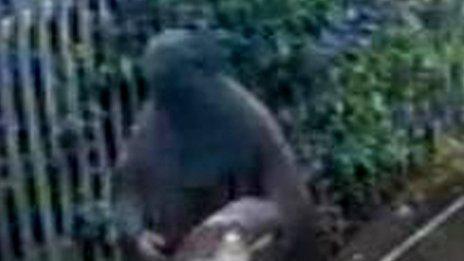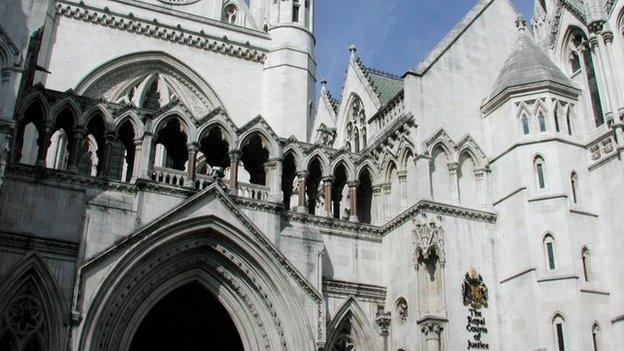How many times did court doors close?
- Published
One for spy thriller fans and conspiracy theorists: in the last year, the government has asked judges five times to let it give secret evidence to defend itself in otherwise open court cases.
The figure comes from the government's first annual report on the number of times it has sought to use controversial new powers to close court doors, external on grounds of national security.
These powers for civil courts were created in the 2013 Justice and Security Act after a slew of cases in which the government had faced claims of collusion in the ill-treatment of terrorism suspects in the wake of 9/11. The rules governing criminal cases are different - although prosecutors recently tried and failed to launch the first fully secret trial in modern times.
Ministers settled the largest case - involving former Guantanamo Bay inmates - for millions of pounds long before judges faced the question of disclosing sensitive national security material.
The Justice and Security Act, external made sure such a situation would never arise again.
Under the new powers, ministers can ask for a "closed material procedure" (CMP) - an order to bar the public, press and claimant in a case from court.
A security-cleared barrister would be allowed to see the evidence for the claimant - although that lawyer is banned from passing any of that information to his client or seeking his instructions once the case has begun.
Critics of the secret system say it denies justice to the claimant because they can't argue properly against evidence they have not been able to see. Ministers and security officials say the system allows cases to be heard fairly - and the only alternative would be to pay out and settle every case to keep information from court, even if the claim had no merit.

Justice and Security Act
A court may go into secret session if:
a party to the proceedings would be required to disclose material in the course of the proceedings
such a disclosure would be damaging to the interests of national security
the harm to national security would outweigh the public interest in the fair and open administration of justice
a fair determination of the proceedings is not possible by any other means

Terror 'assessments'
The first annual report shows that lawyers for ministers made five applications for a declaration that CMP may be introduced - and judges have so far approved three of them.
The first of the cases involved two terrorism suspects previously subjected to forms of house arrest. They alleged that the UK was mixed up in their ill-treatment three years ago in Somaliland.
Last year one of the men went on the run after leaving a London mosque dressed in a burka.

Now you don't see him: Suspect flees in a burka
In his judgement granting a closed hearing, Mr Justice Irwin said the material that ministers wanted to withhold included "assessments" of the terror threat in East Africa.
Now that may sound unusual because it is common knowledge that the militant group al-Shabab operates in the region and has recruited Westerners to its cause. But the real issue was whether disclosing the official assessments would reveal the government's sources.
Overriding concern
The most unusual use of the act so far has come in an attempt to stop a dissident republican being released from jail in Northern Ireland. Terence McCafferty was jailed a decade ago for possessing explosives after an attempt to bomb a target in Belfast.
He was later released on licence - only for that decision to be reversed when ministers said he was still involved with dissident republicans. In that case, the government has asked for CMP so that it does not have to tell McCafferty how it has formed its assessment of him.
Another of the cases involves seeking a secret hearing to defend asset-freezing orders against people accused of involvement in Iran's nuclear programme. Officials don't want an open court to hear all the ins and outs of how these particular individuals came to be targeted.
Critics predicted that the government would use CMP to cover up wrongdoing or bodged decisions by spooks. That may be true - although security officials would deny it.
But the applications so far reveal that ministers' overriding concern appears to be slightly different.
One of the most important rules of intelligence and spycraft is you must always protect your sources.
So each of these applications looks like the government is worried most of all about letting the rest of us find out... how they know what they know.
- Published28 November 2012
- Published12 June 2014
